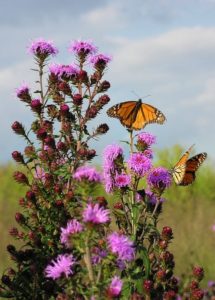Monarch butterflies are just one of the many species that benefit from Roeslein Alternative Energy’s 30/30 vision. This underlying goal is to restore and convert 30,000,000 acres of land to native prairie grasses in just 30 years. This vision benefits farmers economically and positively impacts surrounding ecosystems by creating homes for various types of wildlife, providing erosion control, and preventing flooding.
In the last two decades, the monarch butterfly population has dramatically decreased by approximately 90 percent according to the National Wildlife Foundation. The lack of milkweed (the monarch butterflies’ only host plant), removal of native plants and an increase in development and agriculture are some of the main causes. Adult monarch butterflies use nectar from native prairie wildflowers as a primary food source and lay their eggs on milkweed. Once the eggs hatch, the larvae eat and absorb toxins from the milkweed leaves. These toxins ward off predators throughout their lives.
Some may argue that corn and soybeans provide pollen and nectar as well, but these plants only bloom for so long leaving butterflies and other pollinators without a food source. The continuous food supply provided by native prairie mixes is crucial throughout late-summer and fall when pollinators are storing resources for the winter.
Roeslein Alternative Energy (RAE) was founded in 2012 as an operator and developer of renewable energy production facilities that converts agricultural and industrial wastes, along with renewable biomass feedstocks to renewable natural gas and sustainable co-products. RAE engages in these business operations with a focus on incorporating native prairie restoration. RAE is a limited liability corporation with its principal offices located in St. Louis, Missouri. To find out more, please visit www.roesleinae.com.


